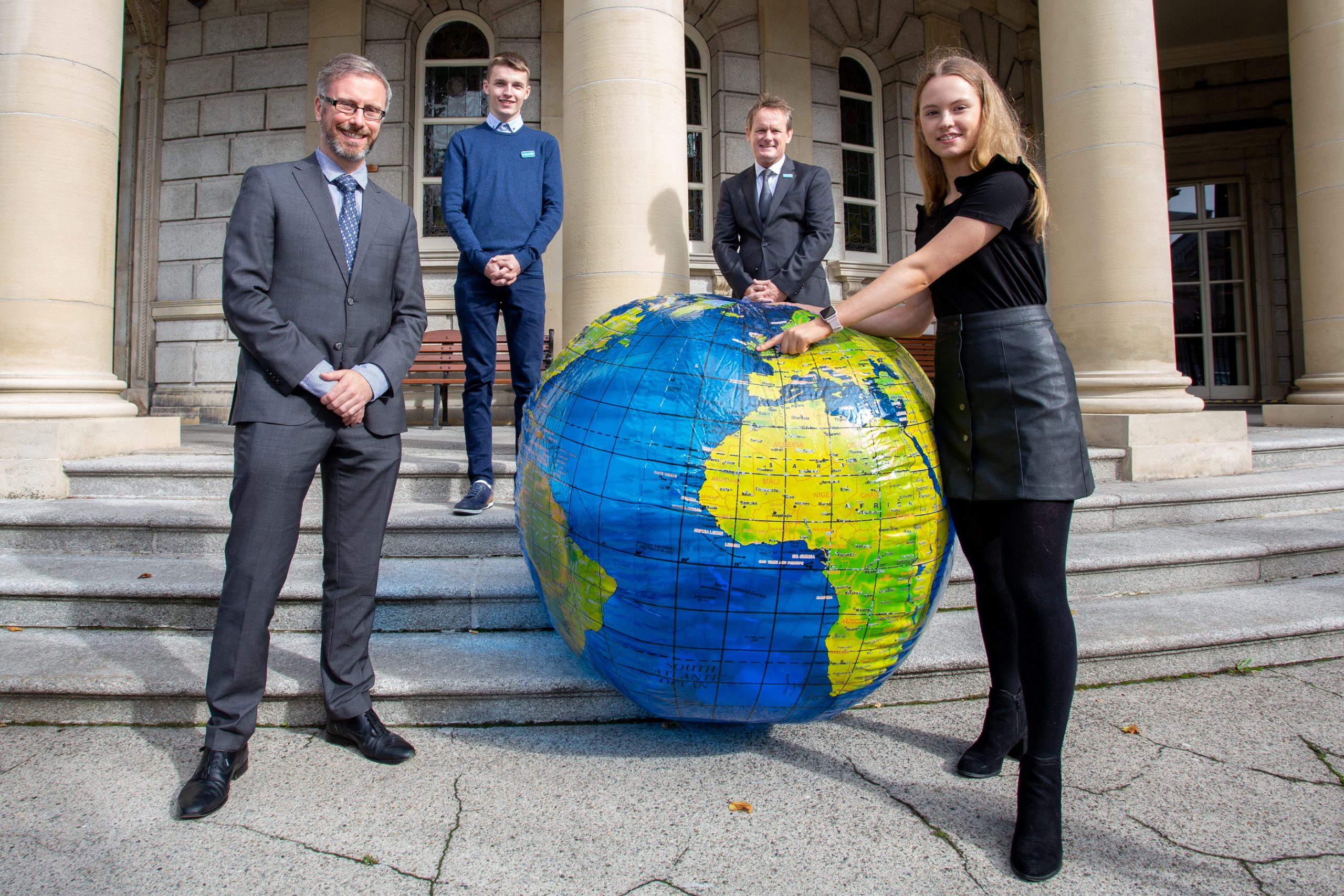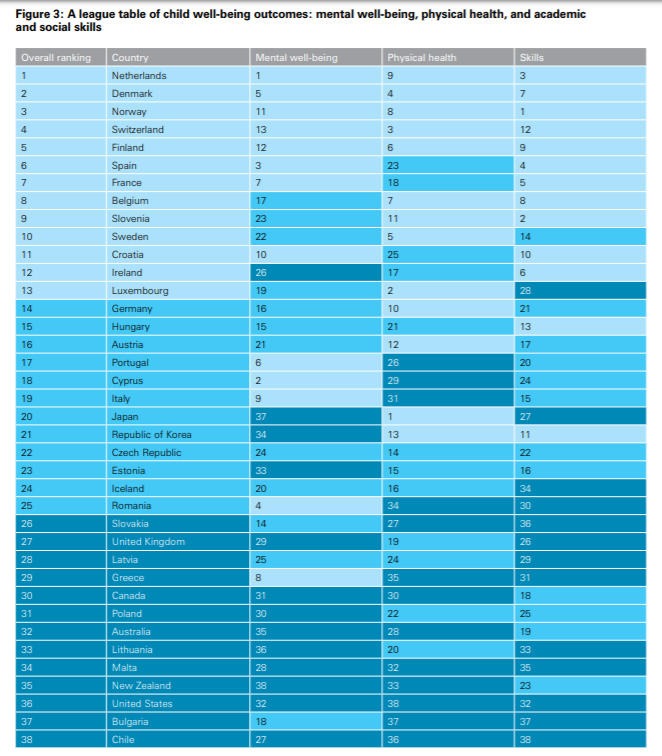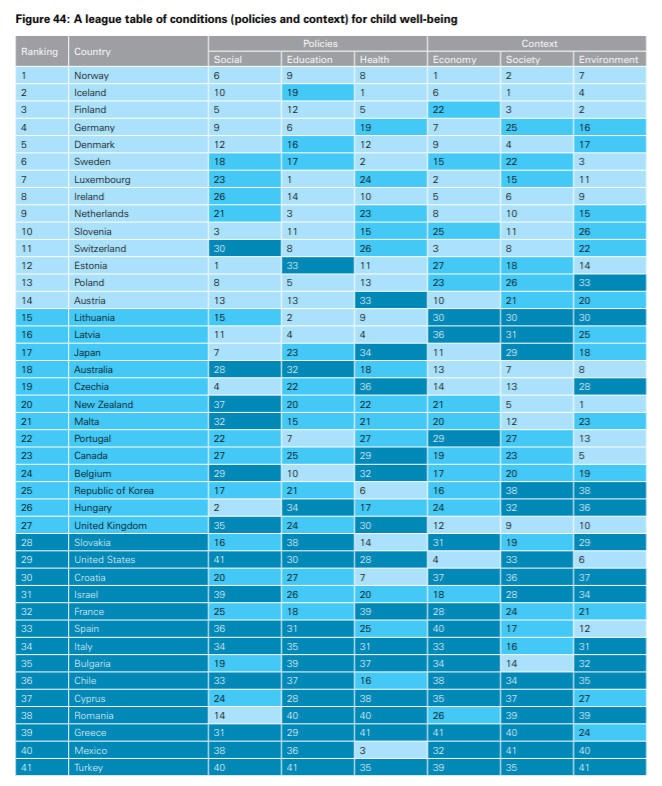Minister launches new report ranks Ireland in top third for child well-being but shows young people struggling with mental health; highlights substantial threats from COVID-19 pandemic

Minister for Children, Disability, Equality, and Integration, Roderic O’Gorman TD, UNICEF Youth Advocate Charles Gallagher, Peter Power, Executive Director of UNICEF Ireland, and Kim Bartak, UNICEF Youth Advocate. Photo: © Barker/UNICEF
DUBLIN/FLORENCE/NEW YORK, 3 September 2020 –Suicide, unhappiness, obesity and poor social and academic skills have become far-too-common features of childhood in high-income countries, according to the latest Report Card issued today by the UNICEF Office of Research – Innocenti, and launched in Ireland by the Minister for Children, Disability, Equality, and Integration, Roderic O’Gorman.
UNICEF’s Report Card Series – now running for 20 years – uses comparable national data to rank EU and OECD countries on childhood. Worlds of Influence: Understanding what shapes child well-being in rich countries uses pre-COVID-19 data and features a league table according to children’s mental and physical health and academic and social skillset. Based on these indicators the Netherlands, Denmark and Norway rank as the top three places to be a child among wealthy countries. Ireland ranks 12th among 38 OECD/EU countries for child well-being.
Key findings for Ireland
Ireland scores best on academic and social skills (6th), but fares worse on physical health (17th) and mental well-being (26th). More than six in 100,000 Irish adolescents aged 15-19 die by suicide.

On life satisfaction, children in Ireland rated themselves as having one of the lowest rates in the OECD/EU (72%), with 28% marking a score of 5 or under on a scale of 10. Among the issues contributing to these low scores, body image, pressure to succeed in school, bullying and their sense of meaning or purpose in life.
Irish children were well below the OECD average in their sense of meaning or purpose in life. Sense of purpose has previously been measured in the PISA study, with only 60% of 15-years-olds in Ireland agreeing that ‘My life has a clear meaning or purpose’.
Meanwhile, children who worry about the environment tend to have lower life satisfaction.
Over a quarter (27%) of Irish 11-15-year-olds said they were too fat and 14% said they were too thin. Girls in Ireland are amongst the most likely in the region to link life satisfaction with body image, along with peers in Scotland (United Kingdom), Finland and the Netherlands.
Throughout the region, life satisfaction, varies from 53% in Turkey to 90% in the Netherlands.
This report reveals children’s experiences against the backdrop of nations’ policies and social, educational, economic and environmental contexts, including Ireland’s.
Minister for Children, Disability, Equality, and Integration, Roderic O’Gorman said: “I’m pleased to launch UNICEF’s report. It’s positive that we rank so highly for children’s well-being, but the findings on satisfaction are concerning.
We want Ireland to be a great place for children to grow up, and so much of what we think about when considering children’s well-being – friendship, education, physical activity, mental health – has been severely disrupted or curtailed by the pandemic.
As a Government, we will continue to invest in children and young people, because in the difficult times, it is especially important we protect our most vulnerable citizens.”

UNICEF Ireland Executive Director Peter Power said: “The situation for children in Ireland is improving, which shows that we have been taking the right steps. But change takes time and we are now facing a significant economic threat. Investing in child well-being brings reliable and positive outcomes in the long-term, and it is the right thing to do.
Despite improvements, we are once again raising concern about the mental health of young people in Ireland, a significant percentage of whom report low levels of life satisfaction. This outcome is not inevitable. We need to address the causes.
We must study the lessons learned during the last recession, when children bore the brunt of austerity measures. The Government must continue to invest in child well-being, during this difficult economic period, or face spikes in child poverty and inequality.”
Across the region
Mental health: In most countries, less than four-fifths of children report being satisfied with their lives. Turkey has the lowest rate of life satisfaction at 53 per cent, followed by Japan and the United Kingdom.
Physical health: Obesity and overweight rates among children have increased in recent years. Around 1 in 3 children across all countries are either obese or overweight, with rates in Southern Europe also sharply increasing.
Skills: On average 40 per cent of children across all OECD and EU countries do not have basic reading and mathematics skills by age 15. Children in Bulgaria, Romania and Chile are the least proficient in these skills. Estonia, Ireland and Finland the most proficient. In most countries, at least 1 in 5 children lack confidence in their social skills to make new friends.
The report also contains data on clear areas of progress in child well-being. On average, 95 per cent of pre-school aged children are now enrolled in organised learning programmes, and the number of young people aged 15-19 not in education, employment or training has declined in 30 out of 37 countries. Yet, these important gains are at risk of falling back due to the impact of COVID-19.
“Many of the world’s richest countries – which have the resources they need to provide good childhoods for all – are failing children,” said Gunilla Olsson, Director of UNICEF Innocenti. “Unless governments take rapid and decisive action to protect child wellbeing as part of their pandemic responses, we can continue to expect soaring child poverty rates, deteriorating mental and physical health, and a deepening skill divide among children. COVID-19 related support for families and children are woefully inadequate. More must be done to provide children with a safe and happy childhood – now.”
Due to the COVID-19 outbreak, in the first half of 2020 most of the countries covered in the report kept schools closed for more than 100 days while strict stay-at-home policies were also implemented[1].The report notes that loss of family members and friends, anxiety, stay-at-home restrictions, lack of support, school closures, the balancing of work and family life, poor access to healthcare, combined with the economic loss caused by the pandemic are catastrophic for children’s well-being, affecting their mental and physical health, and their development.
Before the COVID-19 outbreak the average relative child poverty rate across the 41 countries was 20 per cent. With GDP expected to fall over a two-year period in almost all of these countries[2],unless governments take immediate remedial actions, child poverty will rise.
On the basis of the report and these recent developments UNICEF is calling for the following steps to protect and improve child wellbeing:
- Take decisive action to reduce income inequality and poverty and ensure that all children have access to the resources they need.
- Rapidly address the serious gap in mental health services for children and adolescents.
- Expand family-friendly policies to improve work-family balance, especially access to high-quality, flexible and affordable early-years childcare.
- Strengthen efforts to protect children from preventable diseases, including reversing recent falls in measles immunization.
- Improve COVID-19 policies that support families with children and ensure budgets that support child well-being are protected entirely from austerity measures.
Read more about what these findings mean for young people in Ireland on this blog by report author Yekaterina Chzhen.
ENDS
###
NOTE: Please contact UNICEF Ireland to enquire about interview possibilities or to seek assets.
Notes for editors:
Worlds of Influence builds on previous rankings of child well-being in Report Cards 11 (2013) and 7 (2007) to provide a more comprehensive view of well-being that assesses children’s own actions and relationships, the networks and resources available to their caregivers as well as national policies and context.
Visit the report microsite and download the full report: http://www.unicef-irc.org/child-well-being-report-card-16
Launch event policy panel discussion
Download press kit, multi-media materials and digital assets
About the UNICEF Office of Research – Innocenti
The Office of Research – Innocenti is UNICEF’s dedicated research centre. It undertakes research on emerging or current issues in order to inform the strategic directions, policies and programmes of UNICEF and its partners, shape global debates on child rights and development, and inform the global research and policy agenda for all children, and particularly for the most vulnerable.
Follow UNICEF Innocenti on Twitter and Facebook
About UNICEF
UNICEF works in the world’s toughest places, to reach the world’s most disadvantaged children. Across more than 190 countries and territories, we work for every child, everywhere, to build a better world for everyone.
For more information about UNICEF and its work for every child, visit our website or follow us on Twitter and Facebook
For more information, please contact:
Aedín Donnelly, Communications Manager for UNICEF Ireland, aedin@unicef.ie, 085 1395272
Georgina Thompson, UNICEF New York, +1-917-238-1559, gthompson@unicef.org
Dale Rutstein, UNICEF Florence, + 39-3357582585, drutstein@unicef.org
Kathleen Sullivan, UNICEF Innocenti, Florence, +39 055 2033 222, kcsullivan@unicef.org
[1] https://ourworldindata.org/policy-responses-covid
[2] http://www.oecd.org/economic-outlook/june-2020/




